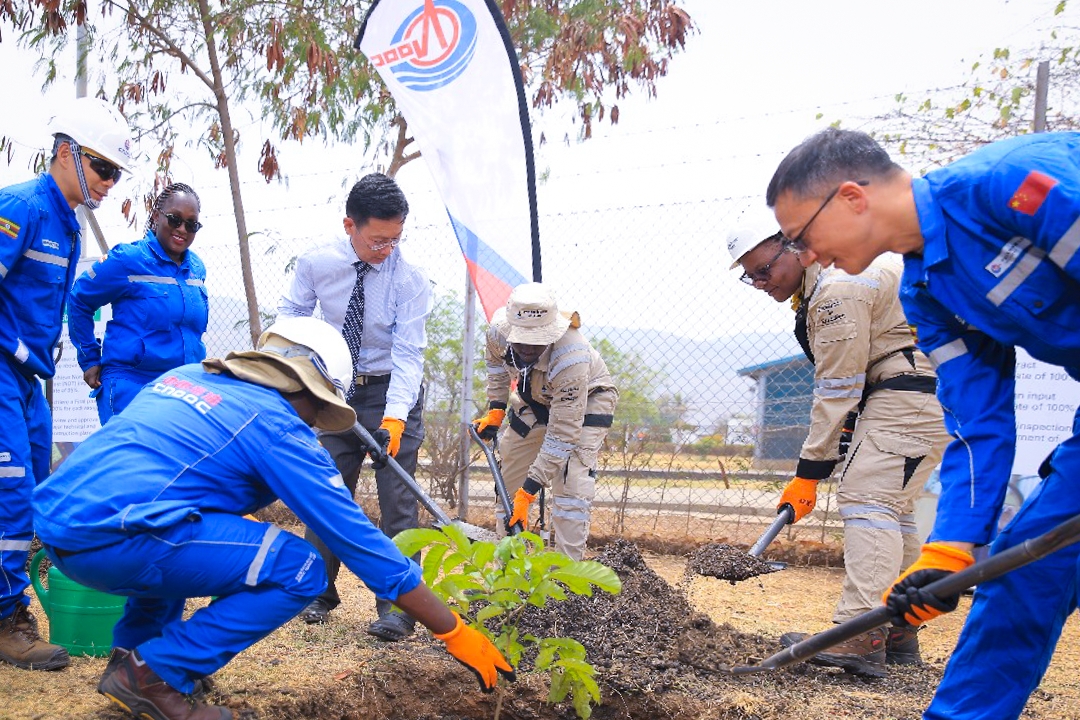The China National Offshore Oil Corporation (CNOOC) Uganda Limited has reiterated its commitment to protecting the environment and cultural heritage while ensuring sustainable development that aligns with global environmental standards.
During a recent visit to the Kingfisher Oil Field in Buhuka, Kikuube District, Mr. Liu Xiangdong, President of CNOOC Uganda Limited, emphasized the importance of balancing modern industrial advancements with ecological preservation. The visit included the launch of a tree-planting initiative and an art competition designed to raise awareness among young people about sustainability and environmental protection.
A Green Future: Tree-Planting for Carbon Capture and Biodiversity
CNOOC Uganda Limited has committed to planting 1,000 trees, including fruit-bearing species like mango, jackfruit, and avocado, as part of its KFDA Green Ecological Oilfield Development Programme. Ms. Aminah Bukenya, the head of CNOOC’s Corporate Department, explained that the initiative aims to combat climate change by enhancing air quality, promoting biodiversity, and offsetting carbon emissions generated by oil exploration activities.
“The tree-planting initiative is a crucial step in creating a greener oilfield by capturing carbon emissions, improving biodiversity, and mitigating global warming,” said Ms. Bukenya.
Participants—including students, teachers, local leaders, and CNOOC representatives—actively took part in tree planting, reinforcing the importance of environmental conservation. Additionally, CNOOC highlighted its adoption of green energy solutions such as solar water heaters, energy-efficient food composting, and the transition from diesel generators to renewable electricity.
Art and Awareness: Engaging the Youth in Sustainability
A central part of the event was an art competition themed “The Beautiful Balance of Heritage and Modernization.” Sixteen students from 30 schools in Kikuube and Hoima participated, illustrating the coexistence of industrial progress and cultural preservation.
“This competition challenges young artists to depict how development can respect and enhance cultural heritage,” Mr. Xiangdong said. “It also fosters knowledge exchange and strengthens Uganda-China ties, reinforcing our shared commitment to sustainable development.”
Chinese Ambassador to Uganda, Mr. Zhang Lizhong, echoed these sentiments, emphasizing the importance of environmental education for the younger generation. He commended Uganda’s government for fostering partnerships that contribute to sustainable social and economic growth.
Environmental Concerns Over Uganda’s Oil Development
Despite these green initiatives, Uganda’s oil development continues to spark global environmental concerns. CNOOC, along with TotalEnergies and the Ugandan and Tanzanian governments, is developing the East African Crude Oil Pipeline (EACOP), a 1,443-kilometer-long pipeline set to transport crude oil from Uganda’s Albertine Graben to Tanzania’s Indian Ocean coast.
Environmental activists warn that EACOP threatens fragile ecosystems, local communities, and biodiversity hotspots across Uganda and Tanzania. The pipeline’s construction has faced opposition from climate advocates, who argue that it could displace communities, endanger water resources, and contribute to global carbon emissions. Developers, however, maintain that rigorous environmental safeguards are in place to mitigate potential damage.
The Road to First Oil: Delays and Challenges
Uganda’s long-awaited oil production, initially expected by 2025, has now been postponed to late 2026 or early 2027 due to financing constraints and infrastructure delays. While progress has been made—such as the completion of key drilling operations and a 47.6-kilometer feeder pipeline—significant challenges remain.
Ms. Bukenya reaffirmed CNOOC’s commitment to meeting government timelines, stating, “We have drilled 13 out of the planned 31 wells, and major construction projects, including the Central Processing Facility and permanent camp, are on schedule.”
Uganda's oil reserves are estimated at 6.5 billion barrels, with 1.4 billion barrels considered recoverable. The Kingfisher oil field alone holds about 560 million barrels, with 190 million barrels expected to be extracted over 25 years.
Students Speak on the Need for Sustainability
Participants in the art competition voiced their thoughts on balancing development with environmental protection:
- Apronale Murungi (St. James Secondary School, S.6): “As we embrace modernity, we must also protect our culture and environment. Industries contribute to pollution, but planting trees helps absorb harmful gases and sustain ecological balance.”
- Dorah Atuhairwe (Mandela Secondary School, S.6): “Competitions like this expose us to new ideas and motivate us to take action in preserving both our environment and our cultural heritage.”
Striking a Balance
Uganda's journey toward becoming an oil-producing nation is fraught with challenges, but initiatives like CNOOC Uganda Limited’s tree-planting and sustainability programs indicate a growing recognition of the importance of environmental stewardship. However, as industrial activities escalate, the crucial question remains: Can Uganda’s oil ambitions truly align with a sustainable and climate-friendly future?
The answer will depend on how well companies, governments, and local communities work together to ensure that economic development does not come at the cost of environmental destruction. 🌍🌱

